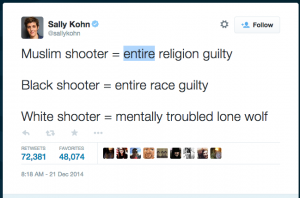Like many people in the progressive/emergent Christian community, I’ve been following the Tony Jones/Julie McMahon controversy for a few weeks now. As I’ve waded through the numerous statements, counter-statements and analysis of the same, I’ve found my opinion of the case flip-flopping several times. It’s to the point where the more I learn about this situation, the less certain I am about any of the details.
The broader issue for me though is how this is playing out. I feel like we are grappling with what Thomas Merton called “the Unspeakable,” a nefarious form of systemic evil that never truly shows its face. Worse, it brings out the worst in all of us. It’s like a poison has infected the community. The more we imbibe of it, the sicker we become.
Personally, I have found this entire situation utterly disillusioning. I was naive enough to think we were “above” all of this. If it’s shown me anything though, it’s that the progressive community is no different than the evangelical community from which it “emerged.” It’s nothing but a web of competing personality cults where book sales, speaking gigs and status are to be preserved at all costs. It’s also shown me that we are prone to believe whatever we want to believe, evidence be damned. I know this not only because I have observed this in others but also because I really want to believe a particular version of the story, and I get uncomfortable and defensive whenever evidence is presented to the contrary. I have to keep checking myself on this. I also see a thirst for blood that is disturbing–most of all b/c I am so tempted by it.
Probably in response to all of the complexity, people on both sides have reduced the issue to a hashtag: #ibelievejulie or #whytony. Then they ask people to line up behind one or the other and offer their support. These hashtags are intended to cut through the complexity, but all they really do is obscure the situation with a cloud of emotion and fear. No matter which side you choose, you’re going to lose.
Both sides claim victim status and are using that to justify their actions against the other. They present a stream of evidence and arguments to convince us that they occupy the moral high ground. Ironically, the harder the two sides seek to differentiate themselves from each other through their competing truth claims, the more similar they become. Each side is concerned only with silencing or countering the other’s narrative. It’s textbook mimetic rivalry, scapegoating, sacrificing one (or a few) to preserve the whole.
As a result, most of us are left clutching a stone, not knowing which way to throw it. Either that or we’re afraid to make any statement that might imply we lean one way or the other, for fear of stones flying at us as well. No one wants to be the scapegoat, so we struggle to figure out which side will “win” and then side with victor. Then, when the situation finally plays itself out, we’ll either say we “knew it all along” or we’ll be like the apostle Peter, hunkering down by the fire and denying we ever sided with the victim.
I have no idea how things will turn out, except that sooner or later someone–or several of us–is going to wind up on a cross. Unless we all drop our stones, walk away and allow Tony and Julie to reconcile with each other and the God they claim to worship, which is what I’m doing right now.











